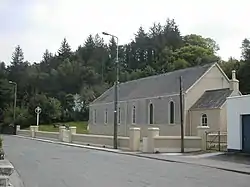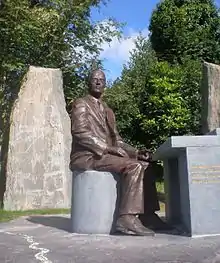Cúil Aodha
Cúil Aodha (pronounced [ˌkuːlʲ ˈeː]), anglicised as Coolea,[1] is a townland and village in the Gaeltacht region of Muskerry in County Cork, Ireland. The area is near the source of the River Sullane in the Derrynasaggart Mountains.
Cúil Aodha
Coolea | |
|---|---|
Village | |
 Church in Cúil Aodha | |
 Cúil Aodha Location in Ireland | |
| Coordinates: 51°55′41″N 09°13′07″W | |
| Country | Ireland |
| Province | Munster |
| County | County Cork |
| Cúil Aodha is the only official name. | |
Geography
Cúil Aodha townland is in the civil parish of Ballyvourney,[2] and is an official Gaeltacht area, where the Irish language is used alongside English.[3]
The village of Cúil Aodha is close to a number of wind farms which are located on the mountains which mark the border between County Cork and County Kerry.[4] The area is mountainous and is led to by mainly narrow roadways.[5]
Cúil Aodha lies within the Cork North-West Dáil constituency.[6]
According to the 2016 census, of the 216 people living in Cúil Aodha and the small area surrounding it, 86% were able to speak Irish.[7] In the Gort na Tiobratan electoral division, in which the village is located, 45% of that population (353 people) stated that they speak Irish on a daily basis outside the education system.[8]
Economy
Coolea cheese is produced in the area. The Mark Éire factory, which specialises in climate control technology, opened in 1987 and is still manages its Irish operations from Cúil Aodha village.[9] There are no amenities such as bars, shops or restaurants in the village. These can be found in nearby Ballyvourney.
Culture
The area surrounding Cúil Aodha was used as a filming location for both Song for a Raggy Boy (2003), directed by Aisling Walsh, and The Wind That Shakes the Barley (2006), directed by Ken Loach.[10][11]
In 1986, Cúil Aodha was twinned with the village of Peumerit-Quintin in Brittany in northwestern France.[12]
People

- Seán Ó Riada (1931–1971), Irish composer, lived in the area between Cúil Aodha village and Ballyvourney until his death, and a bronze monument commemorating him was erected in the area in 2008.[13] His son, Peadar Ó Riada, still conducts the choir 'Cór Chúl Aodha'.[14][15]
- William Hedges (1632–1701), first governor of the East India Company)[16]
- Iarla Ó Lionáird (b. 1964), singer and record producer[17]
- Páidí Ó Lionáird (b. 1968), television presenter and columnist[18]
- Donncha Ó Céileachair (1918–1960), writer and biographer[19]
- Síle Ní Chéileachair (1924–1985), short story writer[20]
Transport
The area is rural and has a dispersed population around the valley. No bus service operates to the village. The nearest Bus Éireann route is the Cork to Tralee route which passes through Ballyvourney which is approximately 2 miles from Cúil Aodha village.
References
- "Cúil Aodha / Coolea". logainm.ie. Placenames Database of Ireland. Retrieved 4 February 2021.
- "Cúil Aodha Townland, Co. Cork". townlands.ie. Retrieved 26 August 2022.
- "RTÉ Archives - A Small But Fiercely Alive Gaeltacht Community (1971)". rte.ie. RTÉ. Retrieved 26 August 2022.
- "Wind farm planned for Cork Gaeltacht to have more turbines added". irishexaminer.com. Irish Examiner. 11 April 2021. Retrieved 26 August 2022.
- "Cúil Aodha community angered by heavy lorry traffic". irishexaminer.com. Irish Examiner. 27 August 2018. Retrieved 26 August 2022.
- "Map D. Cork - Recommended Dáil constituencies" (PDF). Constituency Commission Report 2017. Houses of the Oireachtas. Retrieved 4 February 2021.
- "ArcGIS Web Application". airomaps.nuim.ie. Retrieved 1 January 2021.
- "ArcGIS Web Application". census.cso.ie. Retrieved 1 January 2021.
- "Mark Éire - Contact". Mark Climate Technology. Archived from the original on 11 June 2011. Retrieved 3 April 2011.
- "Reliving the dark school days". irishtimes.com. Irish Times. 14 August 2002. Retrieved 26 August 2022.
- "What to watch on TV this week". irishexaminer.com. Irish Examiner. 26 September 2015. Retrieved 26 August 2022.
- "RTÉ Archives - Food and Song Shared in Brittany (1986)". rte.ie. RTÉ. Retrieved 27 August 2022.
- Ó Canainn, Tomás (2003). Seán Ó Riada: His Life and Work. Collins Press. p. 143.
- Long, Siobhan (14 December 2012). "Cór Cúil Aodha and Peadar Ó Riada". Irish Times. Retrieved 1 February 2021.
- "New Album from Cór Cúil Aodha". The Journal of Music. 7 December 2012. Retrieved 5 February 2021.
- Yule, Henry, ed. (1888). The diary of William Hedges, esq. (afterwards Sir William Hedges), during his agency in Bengal : as well as on his voyage out and return overland (1681–1697) (Volume 2). London: Hakuyt Society. p. vii.
- "Iarla Ó Lionáird". Real World Records. Retrieved 22 January 2016.
- "The low-profile TV star - Celeb News, Independent Woman". Independent.ie. Retrieved 1 June 2012.
- "Ó Céileachair, Donncha". Dictionary of Irish Biography. October 2009. doi:10.3318/dib.006299.v1. Retrieved 27 August 2022.
- "Ó Céileachair, Donncha (1918–1960)". ainm.ie (in Irish). Retrieved 27 August 2022.
